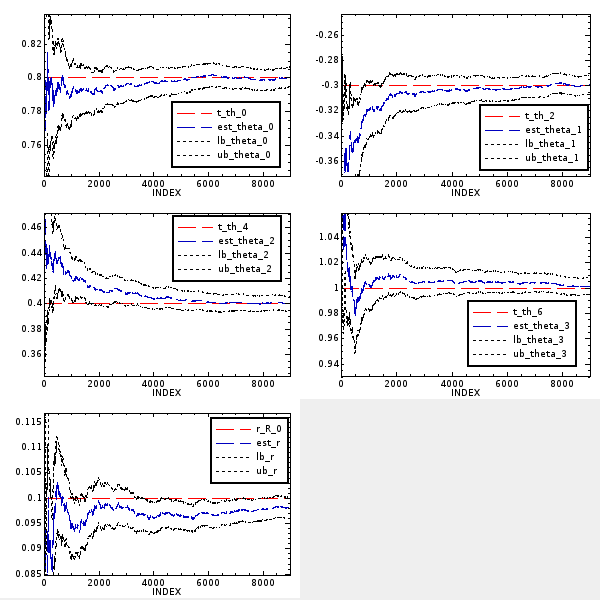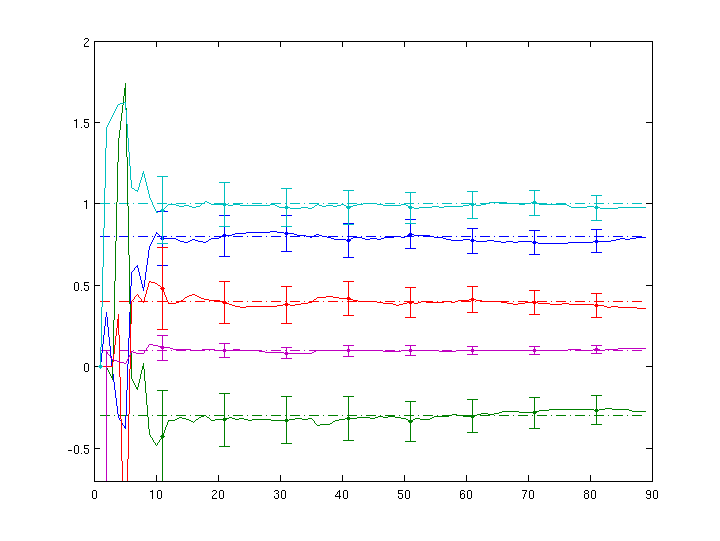Running experiment estimator with ARX data fields
The experiment estimator::cpp can be run either on command line, or as a mex file in Matlab.Command-line usage
In order to use it for estimation of an ARX model, we can define the following User Infos and their use structure://Data generating system system = { type = "ArxDS"; y = {type="rv"; names=["y", "u"];}; u = {type="rv"; names=[]; }; rgr = {type="rv"; names = ["y","y","y","u"]; times = [-1, -2, -3, -1]; }; //AR parameters theta = [0.8, -0.3, 0.4, 1.0, 0.0, 0.0, 0.0, 0.0]; // offset offset = [0.0, 0.0]; //variance r = [0.1, 0.0, 0.0, 1.0]; // log also theta opt="L_theta"; }; //store results logger = { type= "dirfilelog"; dirname = "exp/arx_ui"; maxlen = 1000; // }; //estimation estimator = { type = "ARXest"; y = {type="rv"; names=["y"]; }; rgr = {type="rv"; names = ["y","y","y","u"]; times = [-1, -2, -3, -1]; }; //optional fields dV0 = [1e-3, 1e-5, 1e-5, 1e-5, 1e-5]; //default: 1e-3 for y, 1e-5 for rgr nu0 = 8.; //default: rgrlen + 2 frg = 1.0; // forgetting, default frg=1.0 }; //experiment description experiment:{ ndat = 9000; };
The structure is interpreted by application estimator, which looks for fields:
- system
- description of a Data Source generating Data. The structure must by UI with
type="DS_offspring". In our example, it is of type "ArxDS" which is parsed by bdm::UIArxDS UIbuilder generating a Data Source simulating ARX process. - estimator
- description of a Baysian model used to estimate parameters of the data model. In this case, it is of type "ARXest" which is parsed by bdm::UIARX UIbuilder generating Bayesian estimator of autoregressive processess.
- logger
- description of a way how to store results. UI is of
type="logger_offspring". In this case, it is of class "dirfilelog" which is parsed by bdm::UIdirfilelog which generates object storing data in directory specified by dirname="" field in fileformat understood by program kst.

Matlab mex file
The matlab mex file can be run with exactly the same configuration as above. However, when we wish to see the results in Matlab, we may wish to change the logger object totype="mexlog" which will store the results in a matlab structure.The exact configuration file may look as follows:
//Data generating system system = { type="external"; filename="arx_test.cfg"; path="system";}; //store results logger = { type= "mexlog"; maxlen = 90; // //dirname = "exp/ax"; }; //estimation estimator = { type = "ARXest"; y = {type="rv"; names=["y"]; }; rgr = {type="rv"; names = ["y","y","y","u"]; times = [-1, -2, -3, -1]; }; //optional fields dV0 = [1e-3, 1e-5, 1e-5, 1e-5, 1e-5]; //default: 1e-3 for y, 1e-5 for rgr //nu0 = 8.; //default: rgrlen + 2 frg = .9991; // forgetting, default frg=1.0 }; //experiment description experiment:{ ndat = 90; };
The resulting structure can be displayed using matlab script arx_test_disp.m, typically producing the following results:

 1.5.6
1.5.6